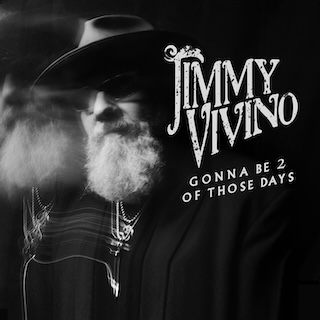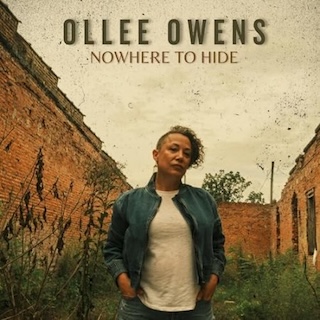
Jimmy Vivino: Raging, roaring and ruminating over love good and bad, times good and bad and along the way offering some philosophical advice born of current affairs
That’ll Be the Day
By David McGee
 GONNA BE 2 OF THOSE DAYS
GONNA BE 2 OF THOSE DAYS
Jimmy Vivino
Gulf Coast Records
For thirty years Jimmy Vivino entertained millions of viewers as a member of Conan O’Brien’s house bands, and in a professional career of 60 years he’s entertained millions more as a sideman, special guest, in Broadway shows, on the radio, with the Beatles tribute band The Fab Faux, currently with Canned Heat, in guest appearances on albums by a veritable Who’s Who of towering artists, and certainly not least of all, on his own solo albums and never ending live shows. Now signed to Mike Zito’s Gulf Coast Records label, he shows no sign of slowing down or coasting on his laurels on this splendid blues-rock showcase co-produced by Vivino with his bandmate, drummer-percussionist Rich Pagano.
On 11 Vivino originals, the artist rages, roars and ruminates over love good and bad, times good and bad and along the way offers some philosophical advice born of current affairs. In many ways Vivino defines his point of view in his song “Better Days Past” wherein he metaphorically aligns himself to his aged mode of transportation: “My automobile run on gasoline and I drive way over 55/need to hear my motor running/makes a man feel he’s alive/’cause I’m much too old now to follow with the critical mass/I’m just a man out of time, better days are in the past…” The song is a long, red-hot howl with sizzling guitar solos weaving in and around the melody and a powerhouse Pagano-led rhythmic thrust, so muscular in all its parts a listener might miss its lyrical lament of time passing.

‘Better Days Past,’ Jimmy Vivino, from Gonna Be 2 of Those Days

‘Blues in the 21st,’ Jimmy Vivino, with Joe Bonamassa, from Gonna Be 2 of Those Days
“Better Days Past” comes at the album’s midpoint, by which time an alert listener will have picked up on the topical nature of this endeavor. With Joe Bonamassa adding his special fire to the mix, the festivities open with the sledgehammer stomp of “Blues in the 21st,” which takes the measure of a divisive era with “talking heads making policy” in a time when “everybody wears a mask” (which might well be referencing the inability to distinguish one partisan from the other absent identifiable apparel or accessories). Later there’s a descent in noir-ish depths in the malevolent strut of “Ain’t Nuthin’s Gonna Be Alright.” This litany of gloomy scenes begins with a friend’s death and expands into a desperate account of an “angel” from West 48th Street whose perverse machinations (“she danced the Cuban mambo and had this magic cat/I was so afraid to just let go so I packed up all my hats/then I was gone, gone, gone…”) drive the singer out of town to the safety of New Jersey, all while the band fashions a creepy backdrop informed by Henry Mancini’s Peter Gunn theme.

‘Back Up Country,’ Jimmy Vivino, with John Sebastian on harp,, from Gonna Be 2 of Those Days

‘Crossed My Mind,’ Jimmy Vivino, from Gonna Be 2 of Those Days
Apart from Bonamassa’s star turn in the opening track, John Sebastian makes two welcome appearances, adding shimmering, wailing blues harp to “Beware the Wolf,” another metaphorical excursion into topicality (“If you look him in the eye/he will turn the other way…if you turn the other check/then there’s hell to pay…”) that packs added punch thanks to Scott Healy’s raucous piano work; and teaming with Vivino on “Back Up the Country” (hard to ignore the Canned Heat allusion there), a laid-back harp-and-guitar blues decrying, in part, ecological disaster (complete with a reference to Joni Mitchell’s “Big Yellow Taxi”) along with sundry other lowdown developments, in which Sebastian is given ample room for soulful, richly textured harmonica soloing (and doubling on acoustic guitar) behind Vivino’s expressive vocalizing. Also addressing climate disaster in apocalyptic terms properly laid to human origins, “Going Down Fast” is given a sprightly Zydeco feel (Scott Healy contributes the wailing accordion atmospherics) in contrast to its doomsday theme. For mean woman blues enthusiasts, well, Vivino doesn’t disappoint, offering the funky warning that is “Ruby is Back” (“…boy, you better hide your heart now/before she stomps it in the ground”) and the 12-bar-styled heartbreaker, “Crossed My Mind” (“You just ran across my mind and walked all over my heart…”), recounting the hapless singer’s inability to break free from the woman who’s taken up residence in his head, featuring a Vivino guitar solo twisting, turning and curling around in the mix in an instrumental expression of the mixed-up confusion victimizing his soul—by song’s end he’s shouting, or declaiming, “Is it love or possession?” before finally conceding, “This must be love!” All in all, it adds a lighthearted touch to the proceedings even as those Vivino tunes referencing sour troubled times remain most vivid in memory.


Kid Ramos comes by his gospel affection honestly, and honesty suffuses the intensity of the performances on Strange Things Happening
Lord, Have Mercy!
By David McGee
 STRANGE THINGS HAPPENING
STRANGE THINGS HAPPENING
Kid Ramos
Nola Blue
It’s not even the midpoint of 2025 and gospel music has already produced three of the best albums of the year. In January came By the Riverside, the latest from one of the genre’s legendary vocalists, Lynda Randle; in February, following the lightning strike that was her debut EP in 2024, Netherlands-based American expat Regina Vandereijk announced the arrival of a singer-songwriter of exceptional gifts in The Lord is There; and in March came another surprise when veteran bluesman Kid Ramos, much awarded (he Orange County Music Awards Lifetime Achievement Award in 2014 and a total of 14 Blues Music Award nominations to date) and much traveled (a number of bands including the Fabulous Thunderbirds, the James Harman Band, Los Fabulocos, et al.), turned to gospel in its vintage form for his first new album in five years, Strange Things Happening, on the Nola Blue label.

‘How I Got Over,’ Kid Ramos with Brian Templeton on lead vocal, from Strange Things Happening
On first blush you might say Kid’s entry is the most surprising, since his 40-plus years in the business have found him producing unapologetic tough blues and blues-rock in his various incarnations. On the other hand, blues and gospel have often been no more than a silly millimeter apart, and both are key components of rock ‘n’ roll’s foundation—King of Rockabilly Carl Perkins made no secret of the influence of gospel, in particular that of Sister Rosetta Tharpe, on his own writing and guitar mastery; Chuck Berry has been quoted as saying his entire career amounted to one long Sister Rosetta Tharp impersonation. On national TV, during his 1968 comeback special, Elvis, who had always acknowledged the influence of black music and black artists on his own music and on rock ‘n’ roll in general, reminded his live audience that “rock ‘n’ roll music is basically rhythm and blues and gospel.” Which is a long way of saying Kid Ramos comes by his gospel affection honestly, and honesty suffuses the intensity of the performances on Strange Things Happening.
Small wonder, then, that he kicks off his 12-track gem with no less than the Sister Rosetta Tharpe classic from which the album takes its title. No better illustration of the R&B-gospel intersection could be had than what the Kid and his mates do with the Sister’s 1944 classic. In a bouncy arrangement sparked by Dave Limina’s rejoicing Hammond organ with Stephen Hodges’ drumming keeping things solid and grounded, Kid backs Brian Templeton’s husky, emotional lead vocal with empathetically husky solid-body guitar punctuations, tasty and to the point in enhancing the arrangement’s forward propulsion. Templeton, himself a 40-years-plus veteran known for his long tenure as the Radio Kings’ lead vocalist as well as solo work touring the U.S., Canada and Europe and associations with the likes of James Cotton and Jerry Portnoy, contributes three original tunes to this endeavor. But his second appearance, on track 2, really wrecks the house: his take on Clara Ward’s 1951 evergreen, “How I Got Over,” is powerhouse defined—muscular but nuanced, at times sounding celebratory, at other times completely mystified by the spiritual force that saved him, as a midtempo R&B backdrop works out behind him, fueled by the Kid’s guitar and Limina’s lively piano and organ, with Templeton shouting and moaning a la Roy Brown leading up to a rip-roaring coda in which he chants heartily “I rose…I rose…I rose this morning” before taking it to the heavens with a final, soul cleansing shout of “I want to thank you, thank you, thank you for being so, being so, so, so good to me,” with Kid and Limina adding the final elegant grace notes to the take. It’s a monumental moment.

‘Strange Things Happening,’ Kid Ramos, with Brian Templeton on lead vocal, from Strange Things Happening

‘God Walks the Dark Hills,’ Kid Ramos with Johnny Ramos on lead vocal, from Strange Things Happening
From whence, you might ask, did this inspiration spring? According to Kid’s own explanation in a press release accompanying the new album, the project’s origin can be traced to a call he received from a preacher friend of long standing, one James Rasmussen, reporting misgivings about the proper appropriation of funds for overseas missionary work he had been supporting. “He decided he was going to start supporting musicians that were playing gospel music and spread the word that way,” says Kid, “and he wanted to know if I wanted to make a God record.” Kid’s next call was to Templeton, who came on board, after which he recruited his singer-songwriter son Johnny and began putting the rest of the band together. Working with producer Chris Lizotte, Kid and company completed most of the work in two days.

‘Nobody But the Lord,’ written and lead vocal by Brian Templeton from Kid Ramos’s Strange Things Happening

‘Oh What a Meeting,’ Kid Ramos, with lead vocal by Johnny Ramos, from Strange Things Happening
There’s no way to overstate the energy, commitment, heightened artistry and sheer commitment to the messages these musicians exude every step of the way. Consider Templeton leading a glorious shouting charge through the ancient warhorse “I’m Working on a Building,” with exuberant support from Limina and Kid in fashioning a soulful country church backdrop for the workout. Consider Johnny Ramos in two show stopping turns—first digging deep for an emotional outpouring of hoped-for salvation in “Oh, What a Meeting,” here rendered as a torchy blues ballad featuring Kid unburdening his soul with a pain-wracked solo to complement his son’s anguish, and later returning with heartfelt, quite stunning testifying on the darkness-turning-to-light inspirational “God Walks the Dark Hills,” which heads into country gospel by way of Kid’s twangy guitar and Limina’s rich, comping organ wash. Consider, too, the frisky, driving blues thrust of Templeton’s “Nobody But the Lord,” with Templeton’s ebullient rendering making the prospect of being abandoned by everyone “but the Lord” seem like a worthwhile experience. And Templeton takes his place as a premier Dylan interpreter with his sturdy but plaintive reading of “Every Grain of Sand,” from Dylan’s Shot of Love album, wherein the singer matter of factly enumerates the moments of God’s revealing presence in life’s passages and in the natural world’s turning over the somber backdrop of Kid’s spare, moaning guitar and Lamina’s low humming organ and softly shimmering keyboard solo beckoning converts. Everywhere you turn there’s another stunner around the corner.

‘I’m Working on a Building,’ Kid Ramos, with lead vocal by Brian Templeton, from Strange Things Happening

‘Every Grain of Sand,’ written by Bob Dylan, lead vocal by Brian Templeton, from Kid Ramos’s Strange Things Happening
To Kid Ramos goes the understatement of the year thus far, when he adds, in the aforementioned press release, “My first gospel record is really from the heart, and I hope people enjoy it.”
Job done, Kid. God bless you.


Ollee Owens: ‘…you got to find some solid ground/this old world can get you down’
Hiding in Plain Sight
By David McGee
 NOWHERE TO HIDE
NOWHERE TO HIDE
Ollee Owens
DistroKid Distribution
With so much good to be said about Calgary-based blues-rock singer-songwriter Ollee Owens, it almost seems unfair to focus on one song, but it’s what that one song means to her and to her listeners, to the world at large that might hear her version, that says so much about the soul of this woman and what she’s trying to communicate in her music.
But let’s say something about her latest album, Nowhere to Hide (released this past October) as a whole: for starters, it’s a great listen, with a solid band assembled by producer-drummer-percussionist Bobby Blazier from the top tier of Nashville session players recorded in sessions at two Music City studios, each player locked into the life lessons Owens communicates over the course of 11 songs, eight of them Owens co-writes, all delivered in a husky, seductive voice (if you hear some Mavis Staples sensuality, some Tracy Nelson muscularity and some Etta James sass, then you’re hearing an important part of where she comes from vocally) formed from hard-earned experience, loaded with wisdom and gravitas in textures smooth and fiery alike. You hear and feel empathy and camaraderie in the funky rhythmic thrust of “Solid Ground,’ in Rahsaan Barber’s rich sax and especially in Gabe Klein’s exuberant organ bursts. The track is alive with energy and life, the perfect complement for one of many Owens songs counseling spiritual resilience against daunting odds: “This old world can get you down/hit you high and turn you around/you can’t tell if it’s day or night/feel like you’re in a losing fight/you got to find some solid ground/this old world can get you down.”

‘Some Days,’ Ollee Owens, from Nowhere to Hide
In “Some Days,” against a darker soul-blues backdrop with hints of gospel in the silky background vocals giving way to Chris Rodriguez roaring in with searing lead guitar formulations, Owens offers measured, spiritually based counsel on navigating trying times, to wit:
Odds are stacked up against me
Logic says there’s no way through
Mama always said where there’s a will
There’s a way
And this is what you gotta do
You put one foot in front of the other
Always take the time to help out another
Don’t you forget about the golden rule
You reap what you sow
So don’t be a fool
Ollee Owens has been around and learned enough about life to know whereof she speaks. In her younger years she saw music as the vehicle for making sense of life’s trials and tribulations. She also married young and with her husband raised three daughters, one of whom was born with a cognitive disability. Putting her budding music career on hold, she devoted 15 years to being a full-time mother to her children—“I focused on being present and engaged for my daughters”—before returning to the boards in 2015, breaking out with a couple of hit singles in 2021 and 2022, and releasing an album, the tellingly titled Cannot Be Unheard, to considerable acclaim in 2022.

‘Shivers and Butterflies,’ Ollee Owens, from Nowhere to Hide

‘Still in Pieces,’ Ollee Owens, from Nowhere to Hide
Over the course of the Nowhere to Hide journey, Ms. Owens offers a heart tugging blues mea culpa with an uplifting closing salutation in “Love You Better”; a stirring, simmering blues rumination, ”Still in Pieces,” on reclaiming, step by step, a soul shattered by some unnamed personal upheaval (“You said you’re sorry and I want it to be true/but I’m gonna need some time, some time to sort it through”) but hanging on to love, as the redoubtable Will McFarlane (who graces eight cuts on the album) injects searing guitar and the background singers become a haunting Greek chorus behind Owens, moaning “I’m all in pieces…I’m all in pieces…”—a sad state of affairs that Owens ameliorates immediately in the sweet, swaying sentiments of her buoyant love song, “Shivers and Butterflies” (“…there isn’t anything I wouldn’t do for you/‘cause I’m in so deep and I feel so free/I’m just love, love, lovin’ you…,” she coos as Chris Rodriguez seconds the emotion with razor-edged guitar punctuations).

‘Lord Protect My Child,’ written by Bob Dylan; Ollee Owens, from Nowhere to Hide
But about that one song. It seems more artists are suddenly discovering Bob Dylan as a gospel or spiritual songwriter—most recently Kid Ramos and Brian Templeton with their moving take on “Every Grain of Sand” on Kid’s new gospel long player, Strange Things Happening. Ms. Owens turned to a Dylan cover to close Nowhere to Hide in the form of “Lord Protect My Child.” Originally recorded in 1983 sessions for but left off Dylan’s Infidels album, it didn’t appear in official release until 1993’s The Bootleg Series Volumes 1-3 (Rare and Unreleased) 1961-1991. Dylanologists speculate the bard left it on the cutting room floor because (a) he didn’t want to engender any speculation about which of his children it might have been addressing or (b) he decided it was too derivative of other work he had done. Regardless, it remains a rather obscure Dylan entry save for its inclusion in a version produced by Chris Brubeck and performed by Susan Tedeschi, Derek Trucks and Dave Brubeck as the theme song for a human trafficking documentary, Not In My Life, released in 2011. Ms. Tedeschi has included it in her live sets and it’s fair to say hers is the best-known version, until now. There’s hardly any way to adequately describe the depth of emotion Ms. Owens plumbs in her gospel-rich version, with its soundscape defined by Cord Martin’s somber sax, Chris Rodriguez’s understated, sustained slide cries, later erupting in a profound, electrifying volley, and DeMarco Johnson’s organ and piano coming straight out of the church. Over it all Ms. Owens declaims like a woman possessed, digging into every phrase, exploring the entire range of her voice, and squeezing every last bit of emotional conviction and meaning she can from Dylan’s plea. At the end of the video for the song, she collapses onto a couch, less physically than emotionally drained, the visual depiction of what we hear on the recording. Hard not to see this as a moment when the parent of a special needs child tapped into all the commitment, all the fears, all the burdens she bears with unconditional love, in beseeching a higher power for safe passage for one and all. On an album replete with so many windows into this artist’s struggles and spiritual challenges, as well as triumphs, Ollee Owens makes our last view of her, so to speak, the most vivid and memorable of all. Truly, in the end, she has nowhere to hide. That’s her gift to us.

